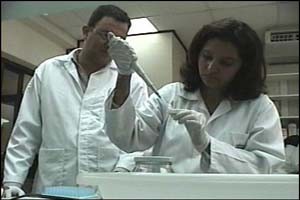
Only until recently, the Forensic Medicine Directorate of the Government of Honduras’ Public Ministry was so poorly equipped that it provided almost no assistance to prosecutors. Other than providing the type of blood of the accused and the defendant, there was very little else the lab findings could be used as evidence.
On December 10, 2002, the Forensic Medicine Directorate opened a DNA laboratory with equipment donated by USAID. Due to advancements in new DNA technology, forensic medicine experts in Honduras now play an expanded and critical role at the crime scene and in court. Their scientific findings have helped convict or acquit defendants, without regard to political or socio-economic status.
In the first five months of operation, the new DNA laboratory produced useful evidence for thirty-four cases. The DNA laboratory is certified to test blood, hair, fingernails, semen, and bone samples. Within the next five years, the laboratory expects to offer comprehensive DNA services for criminal and civil cases in Honduras, and to assist other countries in the region that do not have DNA analysis technology.







Comment
Make a general inquiry or suggest an improvement.